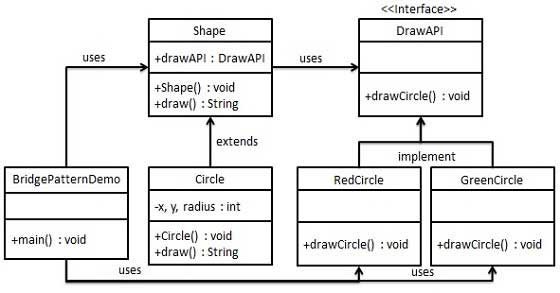
Creational Design Patterns
- Design Patterns - Factory Pattern
- Abstract Factory Pattern
- Design Patterns - Singleton Pattern
- Design Patterns - Builder Pattern
- Design Patterns - Prototype Pattern
Structural Design Patterns
- Design Patterns - Adapter Pattern
- Design Patterns - Bridge Pattern
- Design Patterns - Filter Pattern
- Design Patterns - Composite Pattern
- Design Patterns - Decorator Pattern
- Design Patterns - Facade Pattern
- Design Patterns - Flyweight Pattern
- Design Patterns - Proxy Pattern
- Chain of Responsibility Pattern
Behavioral Design Patterns
- Design Patterns - Command Pattern
- Design Patterns - Interpreter Pattern
- Design Patterns - Iterator Pattern
- Design Patterns - Mediator Pattern
- Design Patterns - Memento Pattern
- Design Patterns - Observer Pattern
- Design Patterns - State Pattern
- Design Patterns - Strategy Pattern
- Design Patterns - Template Pattern
- Design Patterns - Visitor Pattern
J2EE Design Patterns
- Design Patterns - Null Object Pattern
- Design Patterns - MVC Pattern
- Business Delegate Pattern
- Composite Entity Pattern
- Data Access Object Pattern
- Front Controller Pattern
- Intercepting Filter Pattern
- Service Locator Pattern
- Transfer Object Pattern
Design Patterns Useful Resources
Design Patterns - Bridge Pattern
Overview
Bridge is used when we need to decouple an abstraction from its implementation so that the two can vary independently. This type of design pattern comes under structural pattern as this pattern decouples implementation class and abstract class by providing a bridge structure between them.
This pattern involves an interface which acts as a bridge which makes the functionality of concrete classes independent from interface implementer classes. Both types of classes can be altered structurally without affecting each other.
We are demonstrating use of Bridge pattern via following example in which a circle can be drawn in different colors using same abstract class method but different bridge implementer classes.
Implementation
We have a DrawAPI interface which is acting as a bridge implementer and concrete classes RedCircle, GreenCircle implementing the DrawAPI interface. Shape is an abstract class and will use object of DrawAPI. BridgePatternDemo, our demo class will use Shape class to draw different colored circle.

Step 1
Create bridge implementer interface.
DrawAPI.java
package com.tutorialspoint;
public interface DrawAPI {
public void drawCircle(int radius, int x, int y);
}
Step 2
Create concrete bridge implementer classes implementing the DrawAPI interface.
RedCircle.java
package com.tutorialspoint;
public class RedCircle implements DrawAPI {
@Override
public void drawCircle(int radius, int x, int y) {
System.out.println("Drawing Circle[ color: red, radius: " + radius + ", x: " + x + ", " + y + "]");
}
}
GreenCircle.java
package com.tutorialspoint;
public class GreenCircle implements DrawAPI {
@Override
public void drawCircle(int radius, int x, int y) {
System.out.println("Drawing Circle[ color: green, radius: " + radius + ", x: " + x + ", " + y + "]");
}
}
Step 3
Create an abstract class Shape using the DrawAPI interface.
Shape.java
package com.tutorialspoint;
public abstract class Shape {
protected DrawAPI drawAPI;
protected Shape(DrawAPI drawAPI){
this.drawAPI = drawAPI;
}
public abstract void draw();
}
Step 4
Create concrete class implementing the Shape interface.
Circle.java
package com.tutorialspoint;
public class Circle extends Shape {
private int x, y, radius;
public Circle(int x, int y, int radius, DrawAPI drawAPI) {
super(drawAPI);
this.x = x;
this.y = y;
this.radius = radius;
}
public void draw() {
drawAPI.drawCircle(radius,x,y);
}
}
Example - Usage of Bridge Pattern Demo
Use the Shape and DrawAPI classes to draw different colored circles.
BridgePatternDemo.java
package com.tutorialspoint;
public class BridgePatternDemo {
public static void main(String[] args) {
Shape redCircle = new Circle(100,100, 10, new RedCircle());
Shape greenCircle = new Circle(100,100, 10, new GreenCircle());
redCircle.draw();
greenCircle.draw();
}
}
interface DrawAPI {
public void drawCircle(int radius, int x, int y);
}
class RedCircle implements DrawAPI {
@Override
public void drawCircle(int radius, int x, int y) {
System.out.println("Drawing Circle[ color: red, radius: " + radius + ", x: " + x + ", " + y + "]");
}
}
class GreenCircle implements DrawAPI {
@Override
public void drawCircle(int radius, int x, int y) {
System.out.println("Drawing Circle[ color: green, radius: " + radius + ", x: " + x + ", " + y + "]");
}
}
abstract class Shape {
protected DrawAPI drawAPI;
protected Shape(DrawAPI drawAPI){
this.drawAPI = drawAPI;
}
public abstract void draw();
}
class Circle extends Shape {
private int x, y, radius;
public Circle(int x, int y, int radius, DrawAPI drawAPI) {
super(drawAPI);
this.x = x;
this.y = y;
this.radius = radius;
}
public void draw() {
drawAPI.drawCircle(radius,x,y);
}
}
Output
Verify the output.
Drawing Circle[ color: red, radius: 10, x: 100, 100] Drawing Circle[ color: green, radius: 10, x: 100, 100]